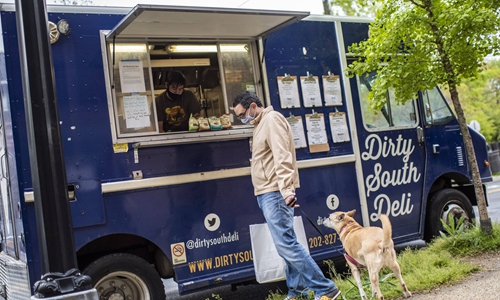Washington food trucks head to the suburbs to find customers
Source:AFP Published: 2020/4/27 18:53:42

"Dirty South Deli�?food truck owner Jason Tipton (left) chats with a regular customer on Friday in a residential area of Washington DC. Photo: AFP
The coronavirus pandemic has emptied downtown Washington DC of its popular food trucks ever since their main customers - lunchtime office workers - fled in March to the safety of their homes.
To survive, the truck operators followed them into the suburbs, taking orders online and advertising through social media.
With drastic staff cuts and major belt tightening, the toughest operators have managed to survive - up to now.
One of these operators is Jason Tipton, co-owner of the "Dirty South Deli."
Tipton recently parked his blue food truck in a residential neighborhood in northeastern Washington and handed out pre-ordered sandwiches wearing a face mask. He also catered to some new customers.
"It's a good surprise, it's nice," Tipton, 42, told AFP.
"Today was very busy," he said, smiling.
For this micro-enterprise with four employees - two of whom are in lockdown - adapting to the new circumstances is key to survival.
"We have an online tool now to take orders, we advertise our tours on Twitter and in the Facebook neighborhood groups, and we use word of mouth," Tipton said.
Tipton has also found customers in places on the outskirts of Washington near the University of Maryland, where teachers and students live.
'On our own'
"We enjoy home cooking but we miss the variety of DC's restaurants," said private music teacher Elise Blake, 37, as she took her "DSD" sandwich.
"This is different, a little bit of a splurge," she said.
"It's savvy for a truck to come to the neighborhoods if you can't go downtown," added Blake's boyfriend David Murray, 37, also a musician.
Tipton seemed satisfied with the day's work.
"We made enough money to break even," he said.
The future, however, seems bleak.
"We're on our own, we just have to make money."
The "DSD" partners would rather tough it out for a while because the alternative is to close.
Tipton said he has not applied for federal aid, and does not know if the loan application he filed with the city will be accepted.
Jamaican blues
On Washington's trendy H Street Kadeem Todd and Denville Myrie have parked their food truck - the "JerkatNite" - in front of the restaurant that they were setting up just as the coronavirus pandemic struck.
The partners, both 28 years old, entered the food business in 2012 by selling organic dishes from Jamaica, their country of origin, at the Howard University campus.
As business grew they bought a second truck, and eight months ago decided to open a brick-and-mortar restaurant.
"COVID-19 changed everything," said Todd.
Starting on March 18 "we had two weeks of complete standstill."
Thanks to their Instagram account and positive word of mouth customers have trickled back.
The truck outside their restaurant accepts take-out orders while their second truck heads out twice a week, prowling for customers around Howard University and an apartment complex in nearby Maryland.
"Delivery apps have kept us afloat, but we can't sustain this much longer," he sighed, adding that he pared his staff of 13 down to seven.
The partners are looking into seeking federal and local aid, but have little hope. "We're trying to get out by ourselves, we can't wait for somebody to save us," he said.
'Focus on the present'
Zack Graybill, chairman of the regional food truck association which represents some 100 operators, hopes the crisis will be over by June -but doesn't want to be too optimistic.
According to a poll of association members, 15 percent are not operating, 35 percent are trying food delivery by themselves or through apps, and "a huge bulk are roaming to residential buildings," he said.
Graybill is also the co-manager of "DC Slices," an Arlington, Virginia-based food truck selling pizza.
"First two weeks, we were just traveling, going to random locations not sure if you would sell $10 or $500 worth of food," he said.
Survival comes at a price: Two of his four trucks are no longer running, and his staff was slashed from 15 to three.
"The important thing is to focus on the present," he said.
Newspaper headline: Meals on wheels
Posted in: FOOD,CULTURE & LEISURE,ARTS FOCUS